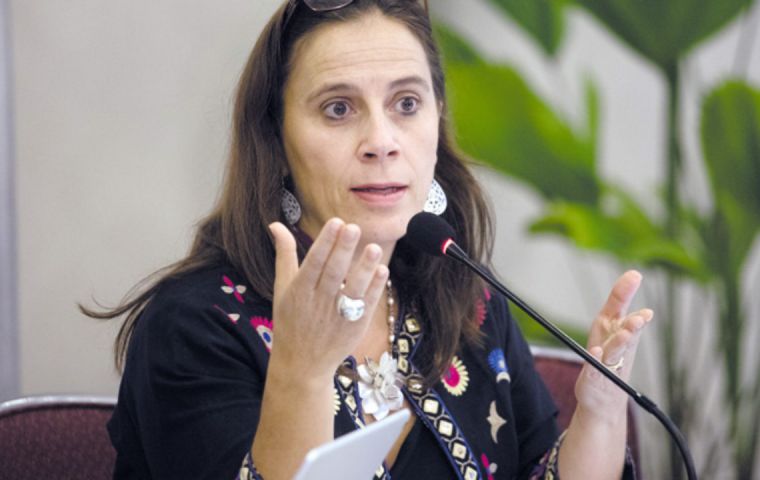MercoPress. South Atlantic News Agency
IACHR still waiting for full green light to land in violence-torn Colombia
 The Colombian State must ”respect the highest standards in terms of freedom of expression, use of force and due diligence,” Urrejola said
The Colombian State must ”respect the highest standards in terms of freedom of expression, use of force and due diligence,” Urrejola said As protests and violence remain part of Colombia's “normal” landscape, the Inter-American Commission on Human Rights (IACHR) continues to wait for an official response from the Government to visit the country.
Complaints about human rights violations have piled up over the past month after between 40 and 60 people have died, thousands have been arrested and several others are listed as missing.
Colombia's Vice President and Foreign Minister Marta Lucía Ramírez, has agreed to the presence of a IACHR mission, but there is no date set for it yet.
“We saw the Foreign Minister's statements yesterday and therefore we are waiting for a response from the Colombian State; in this regard we have not received an official response, without prejudice to which we can also propose a date,” said Antonia Urrejola, president of the IACHR.
Earlier this week the Commission condemned the “serious human rights violations” during the protests and demanded that the Colombian State “respect the highest standards in terms of freedom of expression, use of force and due diligence as well as allowing the IACHR to carry out an observation visit to the country.”
Urrejola explained that once the endorsement for the visit by the government of Iván Duque arrives, three commissioners and a group from the Executive Secretary would spend a week in the country in order to meet with all the parties involved, for which it would be necessary to travel to three cities, in addition to Bogotá, for about four days.
“This allows us to verify in the field the different complaints that we are having; I am not talking about an investigation but I am talking about verifying these complaints and being able to establish what patterns are occurring regarding human rights violations and from that we make a set of recommendations to the State,” Urrejola said in a radio interview.
She stressed that the information gathered is not intended to prepare a complaint, but rather to establish a series of recommendations to the Colombian State and assured that in similar cases with other nations those suggestions served as a “roadmap” to overcome internal problems.
“To whom we make recommendations is to the State, which is the one who must comply with a set of international recommendations, the Commission does not speak to individuals, the Commission speaks to the State that it must establish the conditions for the exercise of human rights,” she added.
According to Colombian prosecution authorities, 43 people have died, 17 directly related to the demonstrations, seven under investigation and the remaining 19 in circumstances yet to be determined, in addition to 129 people listed as missing.
Meanwhile, a plenum session of Colombia's Senate, with an official majority, Thursday denied by 69 votes to 31 a motion to remove Defense Minister Diego Molano from his office.
Molano is being singled out as the person politically responsible for the human rights violations and police brutality.
Non-governmental organizations such as Temblores report 60 murders, since the start of the national strike on April 28 against the Duque government, 43 of them allegedly at the hands of the public force. In addition to that 46 people have sustained eye injuries, 22 have been victims of sexual assault and two members of the security forces were killed.
Among the demonstrators' demands is the dismantling of the infamous Mobile Anti-Riot Squad, the cessation of militarization and the dismissal of Molano.




Top Comments
Disclaimer & comment rulesCommenting for this story is now closed.
If you have a Facebook account, become a fan and comment on our Facebook Page!